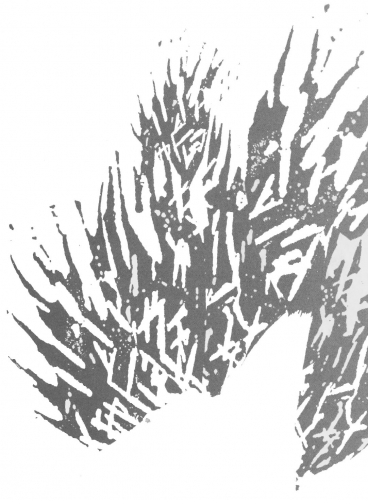I

“Tell me my name,”
I asked Sifu, as ashes
turn the City of Angels blue.
Said he: “Wait until
Gautama’s birthday.”
Tip by singed fingertip,
the ends of orange punk sticks
tinge the burning days of L.A.—
firefighters in bulletproof vests
catapult through flames
prod mini-malls to fall faster
without falling upon
the arms of mothers,
fathers, daughters, sons, who,
picking through the rubble of barrios
outfit their desire, abandon
their plantation names.
II
Santa Ana winds
carry the haze away,
not even Buddha’s hand
can bring back
those who have lost
their breath and beauty here.
If he were walking with straw sandals
across these bruised
boulevards, among people buying
yesterday’s bread and milk, queuing
for a bus downtown, skateboarding
on Venice Beach this afternoon,
would he recognize the Pure Land
in the West,
the country whereby
we sought rebirth?
III
From above,
the sun heats Gautama’s head.
From below,
snails glide up his thighs,
arms, neck, forming
a moist helmet
around his brow.
On the concrete ramp
which divides the Harbor freeway
a Mayan hawks baskets
of strawberries, purplish in the heat.
Two days after the fires,
the same man beckons me to buy
just as he did before. Leaving
the plundered pyramid
of L.A. in the rearview mirror,
I drive south toward the temple
in Little Saigon.
IV
White clouds,
breathe in.
Green waves,
breathe out.
“Crossing the gulf to Siam,”
said the Sifu, “I left my country
on a wooden boat. Topside,
I turned my legs inward
into a lotus form
right foot over left thigh
left foot over right thigh
my thumbs traced
a triangle just below my belly,
while my half-closed eyes met
the hunger of pirates
on ships about to rob us.
They stopped twice, then left, but
it was not my sight that saved us.”
Now a knit cap shields my head
a yellow mantle warms his shoulders.
He lifts his teacup.
“Americans bombed Baghdad,
now burn their own cities.
Always, what we do returns to us—
unfolding flowers, matchless flames.”
V
Palm trees cool
the smoldering skies,
I cannot read the sutras
written upon the leaves.
Wanting her child back
a mother with a dead boy
sought Gautama, who told her:
“Bring me a punk stick
from a house
in which no one has died.”
Far and wide
she searched the town
until friend and folk thought her mad
since no house lay untouched,
each held the spirit
of one who had perished.
VI
Saigon, 1963
Thich Quang Duc,
a Buddhist monk,
protests the regime.
Petrol transforms
his flesh into petals
of flame, leaving his heart
intact in the ashes.
All night we clean the temple,
tomorrow marks the 2536th year
of Buddha’s birth.
Men whitewash the walls,
scrape paint off the windowpanes,
shake out rugs; in the kitchen
women wash baskets of mung beans,
sort red papayas, green pears.
I place chrysanthemums at the altar
into four urns, letting a gray
mouse run among the flowers.
The temple becomes alive at dawn
a boat of passengers moving to the mallet
of the wooden fish drum.
Set low on a table
the bronze Gautama surveys
his shallow pond,
a glass bowl
filled with water and rose petals.
Some bathe the buddha figure,
other mist themselves with water.
“Each day, dust gathers
upon us; each day,
we forget his face,” says Sifu.
With others, I listen.
I don gray robes,
and vow to uphold the Three Jewels
gleaming in the dust.
VII
In Buddha, I seek refuge.
In his teachings, I seek refuge.
In his community, I seek refuge.
“Tinh Thanh—
Calmness Reached is your temple name.”
So these words are spoken,
So these words are written,
So these words are understood.
Yes, three times I repeat
and bow again.
On my hands and feet
I carry the smoke
of incense,
exit the temple door
put on my shoes.
Entering the freeway on-ramp,
returning through disputed
red and blue territories
I recall what the Sifu said:
“Everyone in Saigon
was fighting over the land,
so I built a treehouse, three times
the span of my outstretched arms.
I lived in the tree, suspended
between earth and sky.
Through leaves and branches,
I could hear cursing and singing,
I could smell cooking. How
far I have come to tell you
your name.”
Thank you for subscribing to Tricycle! As a nonprofit, we depend on readers like you to keep Buddhist teachings and practices widely available.